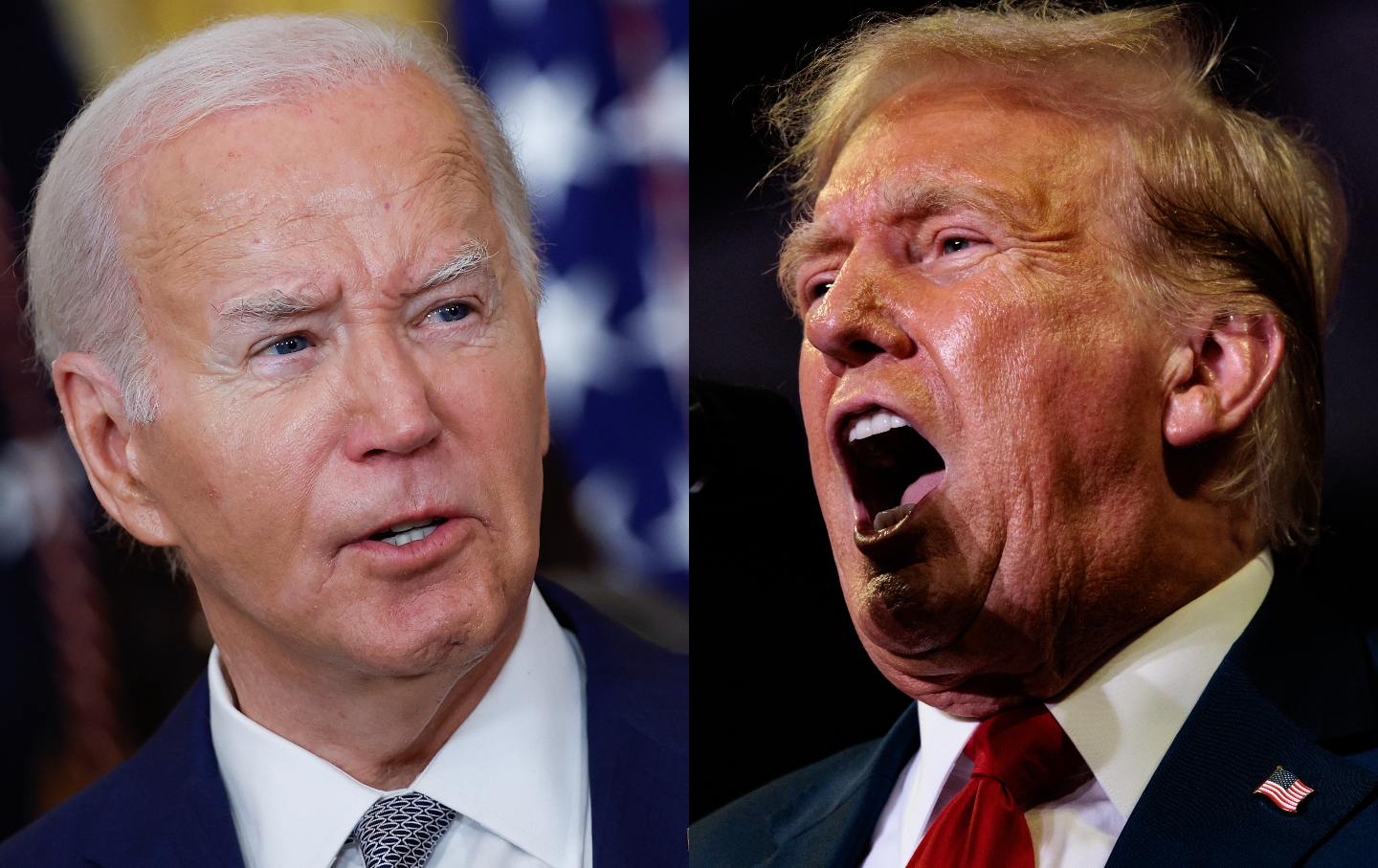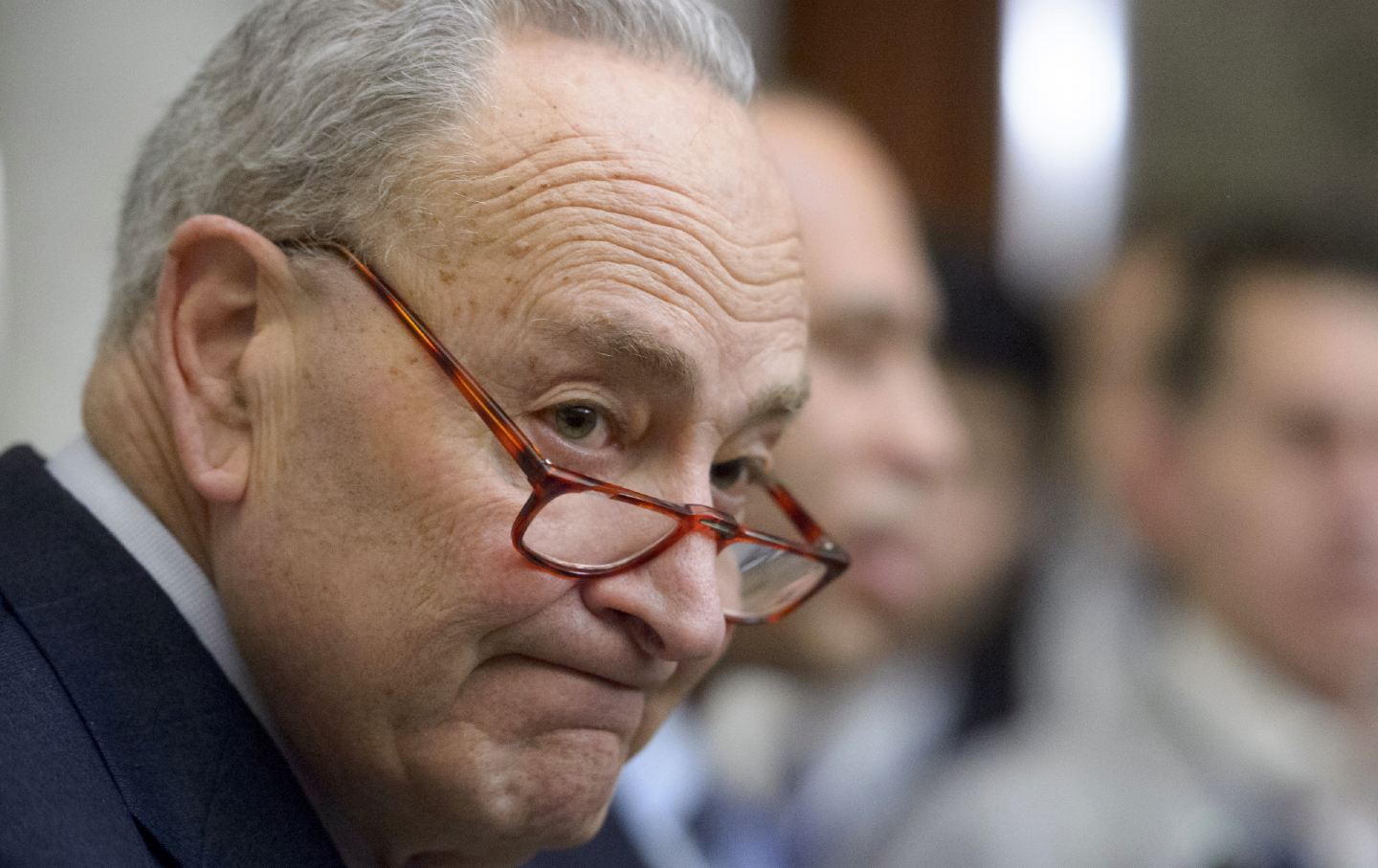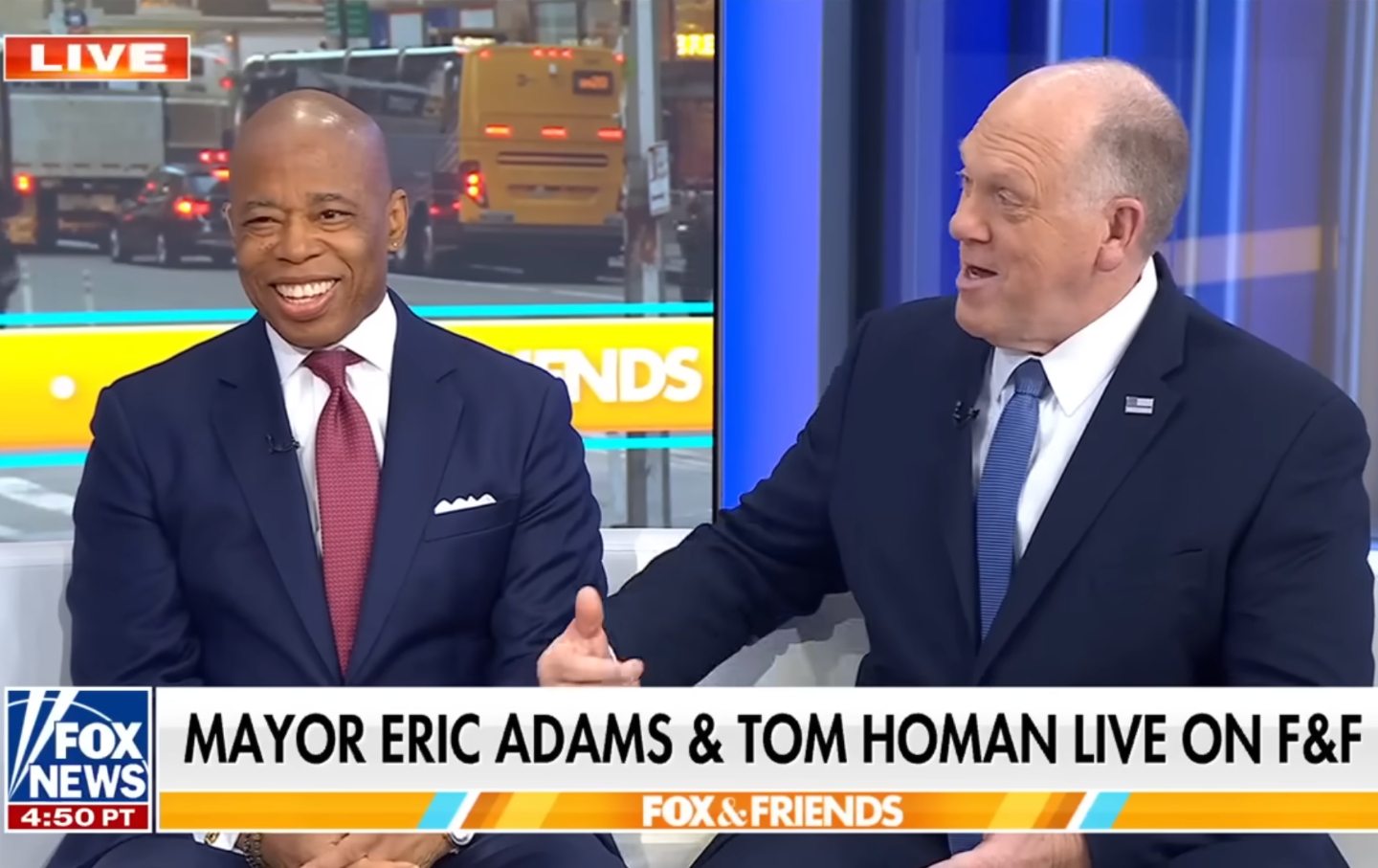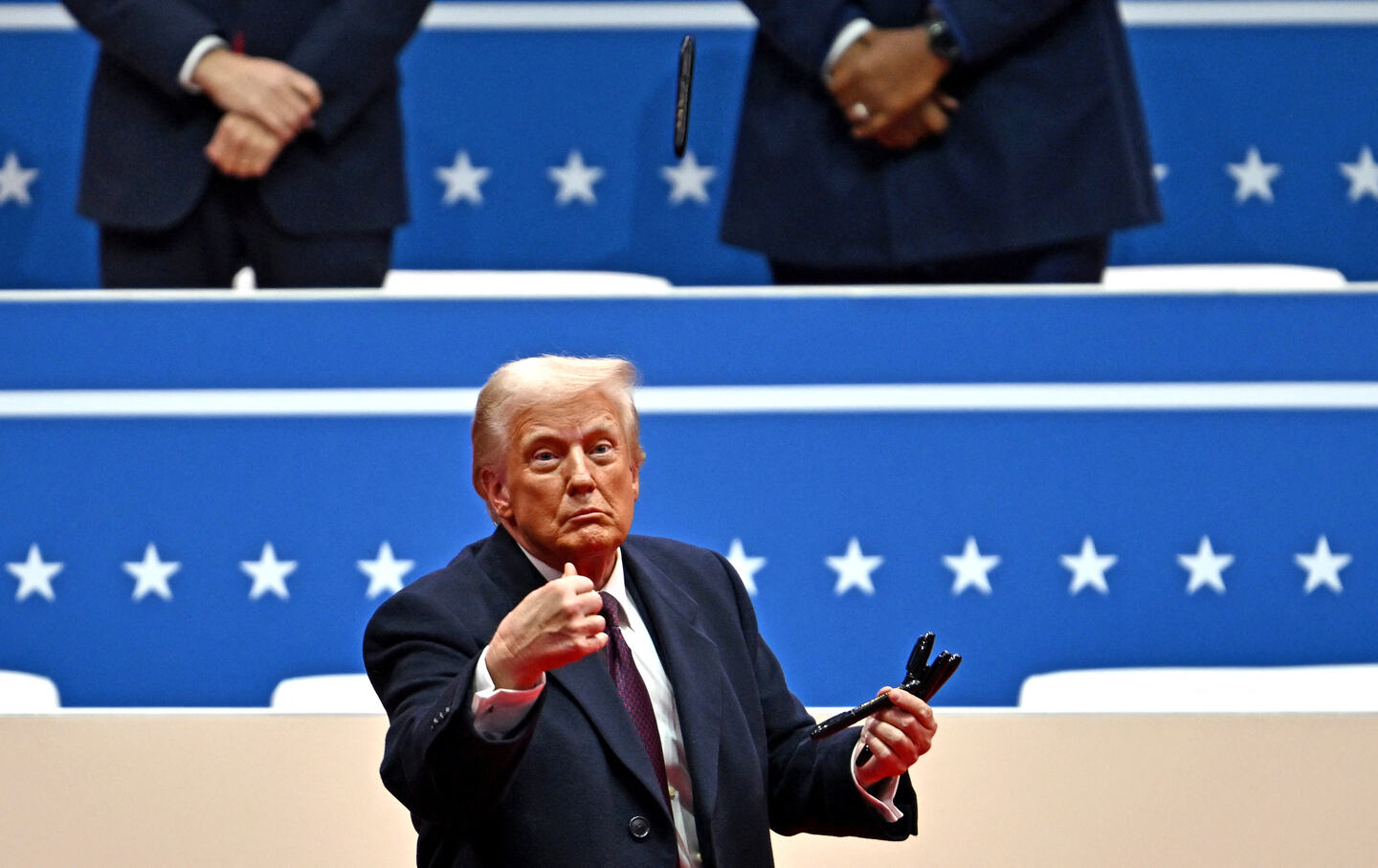Biden Can Trounce Trump in Tonight’s Debate. Here’s How.
Biden has a perfect chance to look past Trump’s ranting and hammer home one key proposal: taxing the rich to protect our social services.

Can Joe Biden win Thursday night’s CNN presidential debate? Absolutely. But that will only happen if Biden puts his face-off with Donald Trump in perspective for the American people, and uses the opportunity this debate provides to frame the issues that will be central to the 2024 campaign.
A realistic perspective on the session will, necessarily, begin with the understanding that a summer-time clash between a pair of octogenarians who have debated each other before and who have basically been running against each other for the past five years is not likely to decide the result of the 2024 presidential election.
For one, it’s way too soon for any single event to be decisive. This is the earliest general election debate between major-party presidential candidates in the history of the United States. The earliest previous debate, between Republican President Gerald Ford and Democratic challenger Jimmy Carter, took place on September 23, 1976, almost three months later than this year’s first forum.
The 2024 debate is so early that neither Biden nor Trump have even been formally nominated by their respective parties. While both of those designations are assured—barring a complete meltdown on the part of one or both of the contenders—this pre-nomination forum is unprecedented.
Assuming that the debate follows the pattern from 2016 and 2020, Trump will try to filibuster every question, interrupt his rival, clash with moderators Jake Tapper and Dana Bash, and generally behave boorishly. The lack of an audience and the fact that microphones are supposed to be live only when individual candidates are speaking may ease some of the tension. But mic cuts are invariably messy, and controversial.
The best bet is that Tapper and Bash, who are already under attack from the Trump camp for alleged biases, will fail to effectively rein in the former president initially and then—out of a combination of frustration and embarrassment—try to assert themselves more aggressively. Trump’s reaction could cause even more havoc.
Eventually, however, the bad theater surrounding Trump will grow boring and weird, as it did in the 2020 clashes between these candidates. That’s when Biden will have his opening. His job is not to dazzle America but rather to present himself as the adult in the room—someone who is thinking about the country while his opponent thinks only about exacting retribution. Biden knows the drill, as his successful 2024 State of the Union address, which saw him counter the likes of Representative Marjorie Taylor Greene, amply illustrated.
But just being competent will only lock in the race as it now stands, with Biden and Trump positioned relatively closely in national and battleground-state polls. To achieve a breakout performance that might actually influence the rest of the race, Biden has to go into Thursday’s debate with a theme, stick to it, and refuse to let Trump knock him off course. The message needs to be clear, precise, and logical. Biden should outline it in his opening statement, return to it wherever possible, and close with it. By doing so, he can control the narrative, no matter how much energy Trump puts into disrupting it.
What should that theme be? Biden should start by clearly distinguishing between the two parties on the question of which is more likely to preserve and expand Social Security, Medicare, Medicaid, and an array of other social welfare programs that are beloved by the American people.
That won’t be hard to do, as the Republicans have made it abundantly clear that they are determined to cut the programs in order to finance tax cuts for the rich. Trump, himself, said in a March 11 appearance on CNBC: “There’s a lot you can do in terms of entitlements, in terms of cutting.” That drew a lot of blowback and Trump’s camp was quick to claim he wouldn’t make cuts. But, as president, he delivered budget plans that specifically sought to cut Social Security Disability Insurance. And in a policy book he wrote before seeking the presidency, The America We Deserve, Trump referred to the entire Social Security program as “a Ponzi scheme” and talked up privatization of some elements of the program while suggesting, “We can also raise the age for receipt of full Social Security benefits to 70.”
But Biden should not merely attack Trump’s dubious record, or bring up controversial past statements from Trump allies, such as Florida Republican Senator Rick Scott, when it comes to addressing threats to Social Security, Medicaid, and Medicare. He should also focus on his own proposals to raise taxes on the rich in order to ensure the long-term stability of those programs and other necessary federal initiatives.
Americans love Social Security, Medicare, and Medicaid, as has been well established over the better part of a century. And they love taxing the rich; a February Navigator Research poll found that 79 percent of registered voters favor higher taxes on billionaires and corporations. Taxing the rich to preserve popular programs is, notes Amy Hanauer, the executive director of the Institute on Taxation and Economic Policy, “good policy and good politics.”
It’s also a perfect focus for a debate in which the president should be striving to frame the issues that will define his fall race with Trump. “The reason to keep fusing Social Security and taxing the wealthy together as one issue is that Trump cannot pretend to match that position,” explains the Progressive Change Campaign Committee in a thoughtful memo on how the president can win the debate. The Republican “must support renewing the Trump tax cuts for billionaires, and that inherently means draining money that ultimately could be used to protect Social Security.”
The PCCC has been making this point for some time. Before the 2024 State of the Union address, the group recommended to the White House—based on polling done with Data for Progress—that the president should argue that “Republicans want to cut taxes for billionaires and cut Social Security. Democrats want to protect Social Security from cuts and ensure billionaires pay their fair share in taxes.” Politico noted that Biden’s speech echoed that message “almost verbatim.”
The president should “go there” again in Thursday’s debate with Trump – not merely as a political tactic but because this is precisely what his administration’s Fiscal Year 2025 budget plan proposes. Unveiled in mid-March, the plan argues that billionaires should be required to pay at least 25 percent of their income in taxes because, as the White House puts it:
Billionaires make their money in ways that are often taxed at lower rates than ordinary wage income, or sometimes not taxed at all, thanks to giant loopholes and tax preferences that disproportionately benefit the wealthiest taxpayers. As a result, many of these wealthy Americans are able to pay an average income tax rate of just 8 percent on their full incomes—a lower rate than many firefighters or teachers. To finally address this glaring inequity, the President’s Budget includes a 25 percent minimum tax on the wealthiest 0.01 percent, those with wealth of more than $100 million.
In addition, the Biden plan restores the top tax rate for the wealthiest Americans to 39.6 percent. When Trump and the Republicans lowered that rate to 37 percent in 2017, they created a circumstance where, the White House explains, “This [Republican] rate cut alone is giving a couple with $2 million in annual taxable income a tax cut of more than $30,000 each year.”
Popular
“swipe left below to view more authors”Swipe →The Biden budget plan details how “it is possible to extend [Social Security] solvency by asking the highest-income Americans to pay their fair share,” and adds, “Currently, middle-class and lower-income Americans pay Social Security taxes on all of their earnings, but higher-income Americans do not. That’s not fair. The President believes that protecting Social Security should start with asking the highest-income Americans to pay their fair share.”
The plan also commits to “extending [Medicare] solvency permanently by requiring wealthy people to pay their fair share toward Medicare and reducing prescription drug costs. The Budget extends HI trust fund solvency indefinitely by modestly increasing the Medicare tax rate on incomes above $400,000, closing loopholes in existing Medicare taxes, and directing revenue from the Net Investment Income Tax into the HI Trust Fund as was originally intended.” How so?
Current law lets certain wealthy business owners avoid Medicare taxes on some of the profits they get from passthrough businesses. The Budget closes this loophole and raises Medicare tax rates on earned and unearned income from 3.8 percent to 5 percent for those with incomes over $400,000. In addition, the Budget directs an amount equivalent to the savings from its proposed Medicare drug reforms into the HI trust fund.
That’s all quite logical, but it’s also something of a mouthful. Biden can simplify things by saying, again and again and again, “Tax the rich to save Social Security, Medicare, and Medicaid.” Trump won’t know what hit him.
Can Joe Biden win the CNN presidential debate? Absolutely.
But that will only happen if Biden puts his joint appearance with Donald Trump in perspective for the American people, and uses the opportunity this debate provides to frame the issues that will be central to the 2024 campaign.
A realistic perspective on Thursday night’s session will, necessarily, begin with the understanding that a summer-time clash between a pair of octogenarians who have debated one another before and who have basically been running against one another for the past five years is not likely to decide the result of the 2024 presidential election.
It’s way too early for that. In fact, this is the earliest debate between major-party presidential candidates in the history of the United States. The next earliest debate between the candidates of the two major parties was a face-off between Republican President Gerald Ford and Democratic challenger Jimmy Carter on September 23, 1976, almost three months later than this year’s first forum. This year, the debate will take place before Biden is nominated by the Democrats and Trump is nominated by the Republicans — though both of those designations are assured, barring a complete meltdown on the part of one of both of the contenders.
Assuming this year’s first debate follows pattern, Trump will try to filibuster every question, interrupt his rival, clash with moderators Jake Tapper and Dana Bash and generally behave boorishly. The fact that microphones are supposed to be live only when individual candidates are speaking may ease some of the tension. But mic cuts are invariably messy, and controversial. The best bet is that Tapper and Bash, who are already under attack from the Trump camp for alleged biases, will fail to effectively rein in the former president initially and then – out of a combination of frustration and embarrassment – assert themselves more aggressively.
The bad theater surrounding Trump will grow boring and weird, as it did in the 2020 clashes between the candidates, and then Biden will have his opening. His job is not to dazzle America but, rather, to present himself as the adult in the room. He knows the drill, as his successful 2024 State of the Union Address, under considerably more demanding circumstances, illustrated.
But just being competent will only lock in the race as it now stands, with Biden and Trump positioned relatively closely in national and battleground-state polls. To achieve a breakout performance that might actually influence the rest of the race, Biden has to go into the debate with a theme and stick to it. It should be clear, precise and logical. Biden should outline it in his opening statement, return to it wherever there are opportunities and close with it, By doing so, he can control the narrative, no matter how much energy Trump puts into disrupting it.
What’s the best approach? Biden should start by clearly distinguishing between the two parties on the question of which is more likely to preserve and expand Social Security, Medicare and Medicaid — and an array of other social-welfare programs that are beloved by the American people. That won’t be hard to do, as the Republicans have made it abundantly clear that they are determined to cut the programs in order to finance tax cuts for the rich. Trump, himself, said in a March 11 appearance on CNBC: “There’s a lot you can do in terms of entitlements, in terms of cutting.” That drew a lot of blowback and Trump’s camp was quick to claim be wouldn’t make cuts. But, as president, he delivered budget plans that specifically. sought to cut Social Security Disability Insurance. And in a policy book he wrote before seeking the presidency, The America We Deserve, Trump referred to the entire Social Security program as “a Ponzi scheme” and talked up privatization of some elements of the program while suggesting that, “We can also raise the age for receipt of full Social Security benefits to 70.”
But Biden’s message should not merely be an attack on Trump’s dubious record, and on controversial past statements from Trump allies, such as Florida Republican Senator Rick Scott, when it comes to addressing threats to Social Security, Medicaid and Medicare. Biden should focus on his own proposals to raise taxes on the rich in order to assure the long-term stability of those programs and other necessary federal initiatives.
Americans love Social Security, Medicare and Medicaid, as has been well established over the better part of a century. And they love taxing the rich; indeed, a February Navigator Research poll found that 79 percent of registered voters favor higher taxes on billionaires and corporations. Taxing the rich in order to preserve popular programs is, notes Amy Hanauer, the executive director of the Institute on Taxation and Economic Policy, is “good policy and good politics.”
It’s also a brilliant focus for a debate in which the president should be striving to frame the issues that will define his fall race with Trump. “The reason to keep fusing Social Security and taxing the wealthy together as one issue is that Trump cannot pretend to match that position,” explains the Progressive Change Campaign Committee in a thoughtful memo on how the president can win the debate. “(The Republican) must support renewing the Trump tax cuts for billionaires, and that inherently means draining money that ultimately could be used to protect Social Security.”
The PCCC has been making this point for some time. Before the 2024 State of the Union address, the group recommended to the White House — based on polling done with Data For Progress – that the president should argue that: “Republicans want to cut taxes for billionaires and cut Social Security. Democrats want to protect Social Security from cuts and ensure billionaires pay their fair share in taxes.” Politico noted that Biden’s speech echoed that message “almost verbatim.”
The president should “go there” again in Thursday’s debate with Trump – not merely as a political tactic but because this is precisely what his administration’s Fiscal Year 2025 budget plans proposes. Unveiled in mid-March, the plan argues that billionaires should be required to pay at least 25 percent of their income in taxes because, as the White House puts it:
“Billionaires make their money in ways that are often taxed at lower rates than ordinary wage income, or sometimes not taxed at all, thanks to giant loopholes and tax preferences that disproportionately benefit the wealthiest taxpayers. As a result, many of these wealthy Americans are able pay an average income tax rate of just 8 percent on their full incomes—a lower rate than many firefighters or teachers. To finally address this glaring inequity, the President’s Budget includes a 25 percent minimum tax on the wealthiest 0.01 percent, those with wealth of more than $100 million.”
In addition, the Biden plan restores the top tax rate for the wealthiest Americans to 39.6 percent. When Republicans led by former President Donald Trump lowered that rate to 37 percent in 2017, they created a circumstance where, the White House explains, “This [Republican] rate cut alone is giving a couple with $2 million in annual taxable income a tax cut of more than $30,000 each year.”
The Biden budget plan details how “it is possible to extend (Social Security) solvency by asking the highest-income Americans to pay their fair share. Currently, middle-class and lower-income Americans pay Social Security taxes on all of their earnings, but higher-income Americans do not. That’s not fair. The President believes that protecting Social Security should start with asking the highest-income Americans to pay their fair share.” The Biden plan also commits to “extending (Medicare) solvency permanently by requiring wealthy people to pay their fair share toward Medicare and reducing prescription drug costs. The Budget extends HI trust fund solvency indefinitely by modestly increasing the Medicare tax rate on incomes above $400,000, closing loopholes in existing Medicare taxes, and directing revenue from the Net Investment Income Tax into the HI Trust Fund as was originally intended.” How so? “Current law lets certain wealthy business owners avoid Medicare taxes on some of the profits they get from passthrough businesses. The Budget closes this loophole and raises Medicare tax rates on earned and unearned income from 3.8 percent to 5 percent for those with incomes over $400,000. In addition, the Budget directs an amount equivalent to the savings from its proposed Medicare drug reforms into the HI trust fund.”
That’s all quite logical, but it’s also something of a mouthful. Biden can simplify things by saying, again and again and again in Thursday’s debate, “Tax the rich to save Social Security, Medicare and Medicaid.”
More from The Nation

Why Democrats Won’t Throw a Real Punch Why Democrats Won’t Throw a Real Punch
Faced with existential threats from the right, the Democratic leadership remains timid; faced with demands for justice from the left, it goes on the attack.

Eric Adams Is a Fascist Collaborator Eric Adams Is a Fascist Collaborator
By cutting a raw deal with the Trump/Musk regime, the mayor is attacking the very fabric of New York City.

David Cole on How the Courts Can Stop Trump David Cole on How the Courts Can Stop Trump
The former national legal director of the ACLU analyzes recent efforts to block the president’s executive orders.

DOGE Is a Massive Scam—Even on Its Own Terms DOGE Is a Massive Scam—Even on Its Own Terms
Even if you believe that Musk is trying to root out waste and fraud (and you really shouldn't), he and his dweeby hatchet bros are only making things more corrupt and expensive.

NYC Mayoral Candidate Zohran Mamdani Wants You to Have More Money in Your Pocket NYC Mayoral Candidate Zohran Mamdani Wants You to Have More Money in Your Pocket
The New York State Assembly member explains how free buses, free childcare, a rent freeze, and city-run grocery stores would make life easier for working-class New Yorkers.



